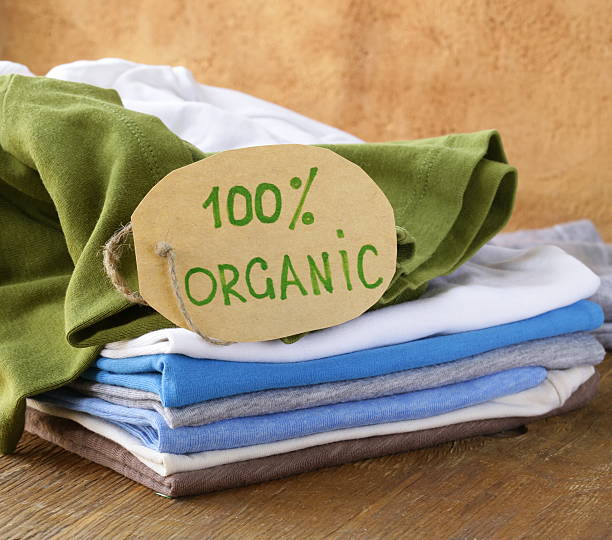Reinventing Comfort and Ethics – Making Clothing with Organic Cotton
The fashion industry is one of the biggest contributors to environmental degradation, and conventional cotton production is particularly resource-intensive and polluting. However, organic cotton clothing offers a sustainable alternative that is no longer just for environmentally conscious consumers, but is becoming the global standard for healthy, sustainable living. As concerns grow about harmful chemicals, unethical labor, and environmental degradation, the shift toward natural fiber clothing is more than just a fashion trend, it’s an inevitable trend.
But what’s so special about organic cotton clothing? Is it truly sustainable? And can it meet the diverse needs of babies, adults, and seniors? We’ll explore the versatility, science, and social value behind this remarkable fabric, while guiding readers on how to identify quality brands, understand labels, and incorporate natural fibers and ethical fashion principles when making truly smart wardrobe choices.
What is Organic Cotton and Why Does It Matter?
Organic cotton is grown using methods that minimize environmental impact, avoiding synthetic pesticides, fertilizers, and genetically modified organisms (GMOs). Instead, farmers use natural pest control, crop rotation, and composting to maintain soil health. According to the Soil Association, organic cotton farming works with nature to build healthy soils that store carbon, helping combat climate change.
Why Organic Cotton Is an Ideal Choice for People of All Ages
From Newborns to Grandparents: One Fabric, Infinite Comfort
Organic cotton, grown without toxic pesticides or synthetic fertilizers, is especially ideal for sensitive skin. Babies, whose skin is thinner and more absorbent, benefit greatly from non-toxic cotton clothing. Seniors, too, often require breathable, hypoallergenic fabrics that reduce irritation and improve comfort.
Organic cotton garments also maintain structural integrity through multiple washes, making them durable and cost-effective for families on a budget.
Scientific Insight:
A 2019 report by the Textile Exchange found that organic cotton uses 91% less water and produces 46% less CO₂ compared to conventional cotton. It also contains lower levels of chemical residues, making it safer for prolonged skin contact—especially vital for young children and allergy-prone individuals.
Compared to conventional cotton, organic cotton offers significant advantages:
| Aspect | Organic Cotton | Conventional Cotton |
|---|---|---|
| Pesticides | Uses natural pest control (e.g., crop rotation, beneficial insects) | Accounts for 16%-25% of global pesticide use, including carcinogens |
| Water Usage | Up to 91% less water, often rain-fed | Over 2,700 liters per T-shirt, depletes water sources |
| Fertilizers | Natural fertilizers, enhances soil health | Synthetic fertilizers, emits greenhouse gases |
| GMOs | No genetically modified seeds, preserves biodiversity | Often uses GMOs, threatens biodiversity |
| Environmental Impact | Reduces pollution, supports biodiversity | Contributes to soil, water, and air contamination |
This table, adapted from Naturepedic, highlights why organic cotton is a critical choice for sustainable fashion.

The Environmental Impact of Organic Cotton
Organic cotton’s environmental benefits are substantial:
- Reduced Chemical Use: By eliminating synthetic pesticides and fertilizers, organic cotton prevents chemical runoff, protecting water sources and ecosystems.
- Water Conservation: Studies, such as those from Textile Exchange, show organic cotton uses up to 91% less irrigation water, relying heavily on rainwater (81% of crops).
- Lower Carbon Footprint: Organic cotton emits 50% less CO2 than conventional cotton, as noted by Maake, contributing to climate change mitigation.
- Soil Health and Biodiversity: Organic farming practices enhance soil fertility and support diverse ecosystems, ensuring long-term agricultural sustainability.
Research from The Organic Center supports these claims, showing that organic cotton production alleviates the environmental impacts of conventional cotton, which is one of the most chemically intensive crops globally.
Health Benefits of Wearing Organic Cotton
Organic cotton is not only eco-friendly but also healthier for wearers:
- No Pesticide Residues: Conventional cotton retains chemical residues that can cause skin irritation or allergies. Organic cotton is free from these, making it safer, especially for children.
- Hypoallergenic: Its chemical-free nature makes it ideal for sensitive skin, as noted by Fabrics Galore, reducing allergic reactions.
- Breathable and Comfortable: Organic cotton’s natural fibers are breathable, regulating body temperature for all-day comfort.
- Durable: Longer fibers make organic cotton stronger, ensuring clothes last longer, as per Maake’s findings.
These qualities make organic cotton a top choice for non-toxic clothing, particularly for those prioritizing health.
Organic Cotton for Every Age: From Babies to Seniors
Organic cotton’s versatility makes it suitable for all ages:
- Babies and Children: Its softness and lack of chemicals reduce skin irritation, making it ideal for baby clothes and children’s wear.
- Adults: From casual tees to professional attire, organic cotton offers stylish, sustainable options for daily wear.
- Seniors: Its breathability and comfort cater to sensitive skin and mobility needs, ensuring ease of wear.
This adaptability ensures organic cotton meets diverse needs across generations.
Top Organic Cotton Clothing Brands You Should Know
Several brands stand out for their commitment to organic cotton and sustainability:
| Brand | Best For | Materials | Price Range | Size Range |
|---|---|---|---|---|
| Pact | Affordable fair trade basics | GOTS-certified organic cotton | $ – $$ | XXS – 3X |
| Organic Basics | Underwear & tanks | Organic cotton | $$ – $$$ | XS – XXL |
| Outerknown | Organic outerwear | Organic & regenerative cotton | $$ – $$$ | XS – XXL |
| Kotn | Egyptian cotton clothing | GOTS-certified ECOTEC cotton | $$ – $$$ | XXS – XL |
| TomboyX | Size/gender-inclusive intimates | OEKO-TEX certified organic cotton | $ – $$ | 3XS – 6XL |
| Everlane | Workwear | 100% organic cotton | $$ – $$$ | XS – XXXL |
These brands, sourced from The Good Trade, offer diverse styles while prioritizing ethical and sustainable practices.


Is Organic Cotton Truly Sustainable? Debunking Myths
Organic cotton’s sustainability is sometimes questioned due to its lower yields, which require 25% more land for the same output as conventional cotton. However, its overall environmental impact is lower when factoring in water savings, reduced chemical use, and soil health benefits. The Wirecutter notes that organic cotton’s environmental trade-offs are offset by its long-term benefits.
Certifications like GOTS and OCS are crucial to ensure authenticity, as fraud concerns exist, particularly in India, the world’s largest organic cotton producer. Despite higher costs, organic cotton’s durability and ethical production make it a worthwhile investment.
How to Identify Genuine Organic Cotton Products
To ensure you’re buying authentic organic cotton:
- Check Certifications: Look for GOTS, OCS, or Fair Trade labels, which guarantee environmental and social standards.
- Brand Transparency: Reputable brands like Pact and Kotn provide supply chain details, ensuring traceability.
- Avoid Greenwashing: Be cautious of vague sustainability claims without certifications.
These steps help consumers make informed choices and avoid misleading marketing.
The Role of Natural Fibers in Sustainable Fashion
Organic cotton is part of a broader shift toward natural fibers like hemp, linen, and wool, which offer similar sustainability benefits:
- Hemp: Durable and low-water, ideal for eco-friendly clothing.
- Linen: Biodegradable and water-efficient, made from flax.
- Wool: Sustainable when ethically sourced, perfect for colder climates.
Choosing natural fibers over synthetics like polyester reduces environmental impact and supports a circular fashion economy.
Ethical Fashion: Beyond Organic Cotton
Sustainability extends beyond materials to include ethical practices. Many organic cotton brands prioritize fair wages, safe working conditions, and worker welfare. Certifications like Fair Trade ensure these standards are met. By choosing brands like Outerknown or TomboyX, consumers support a fashion industry that values both people and the planet.
A Holistic Approach to Dressing
Choosing organic cotton clothing is also a statement of values. It signals support for farmers using regenerative agriculture, opposition to fast fashion’s exploitative practices, and a personal commitment to health and planetary wellness.
Ethical clothing brands that prioritize organic and natural fibers clothing help redefine fashion as a tool for cultural and environmental healing. This makes every organic cotton shirt or onesie not just a piece of clothing—but a conscious act.

Where to Buy Non-Toxic Organic Cotton Clothing
Organic cotton clothing is available through various channels:
- Specialty Stores: Brands like Pact, Organic Basics, and Outerknown offer online stores with certified products.
- Department Stores: Some carry organic cotton lines from reputable brands.
- Second-Hand Options: Platforms like ThredUp allow sustainable shopping by offering used organic cotton clothing.
Always verify certifications to ensure non-toxic, sustainable purchases.
How to Know If a Brand Uses Natural or Non-Toxic Materials
Decoding the Labels: A Quick Guide
To identify truly non-toxic organic cotton clothing, look for the following certifications:
- GOTS (Global Organic Textile Standard): Verifies at least 95% organic fibers and restricts use of harmful chemicals.
- OEKO-TEX Standard 100: Ensures textiles are free from over 100 known toxic substances.
- Fair Trade Certified: Confirms ethical labor and sustainable farming practices.
Brands should also be transparent about their sourcing. If a product claims to be “eco-friendly” but doesn’t name the origin of its cotton or list its certifications, it’s likely greenwashing.
What Makes a Cotton Clothing Brand Sustainable?
A truly sustainable cotton clothing brand considers the entire supply chain:
- Sustainable Sourcing: Uses organic or regenerative cotton.
- Ethical Manufacturing: Ensures fair wages and safe conditions.
- Transparency: Shares detailed supply chain information.
- Circular Practices: Offers recycling or take-back programs.
Brands like Everlane and Kotn exemplify these principles, making them leaders in sustainable fashion.
Seize The Opportunity For Organic Cotton Clothing – Stylish And Ethical At The Same Time
In an age of growing environmental and health awareness, organic cotton clothing is a cornerstone of sustainable fashion, combining environmental, health and ethical benefits. By choosing certified organic cotton from reputable brands, you’re supporting a healthier planet and a fairer industry. Organic cotton is versatile and suitable for all ages, and as its supply continues to grow, it is set to shape the future of fashion. Whether you’re shopping for your baby, yourself or a loved one later in life, choosing non-toxic cotton clothing is a step towards a cleaner wardrobe and a greener planet.
Practical Tips:
Start with a simple change – replace your next T-shirt, pajamas or baby onesie with a certified organic cotton alternative. Note: Your skin, conscience and even laundry habits may feel a little easier.
Sources:
